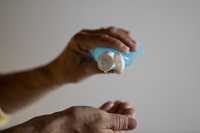So far, there is insufficient knowledge about COVID-19 spreading to newborns from their mothers who tested positive for the virus at the time of the birth. A new study suggests that hygiene precautions can protect neonates from contracting the virus during breastfeeding and skin-to-skin contact with the mother.
Salvatore and colleagues conducted a study with women who tested positive for COVID-19 at the time of the birth of their child. In total, 82 infants born at three New York hospitals between March 22 and May 17 2020 were included in the study. The babies were screened for Coronavirus with a nasopharyngeal swap during the first 24 hours of life, after 5 to 7 days and after 14 days. Additionally, the infants and their mothers were observed regarding the development of virus specific symptoms (e.g. fever, lethargy, and cough). None of the newborns had positive test results.

©Unsplash
Skin-to-skin contact with the mothers was allowed in all three hospitals within the first hour after birth. This policy was not changed during the pandemic. In order to prevent transmission of the virus from mothers to their newborns, some safety measures were implemented. Mothers had to wear surgical masks while being with the baby, needed to wash their hands before touching them and had to clean their chest before breastfeeding. Furthermore, only the mothers were allowed in the hospital rooms. If they stayed in the same room as their baby, the newborn was kept in a closed isolation bed. 12 of the 82 newborns were admitted to the neonatal intensive care unit. Their mothers could visit them only 14 days later if they did not have a fever for at least three days.
At the time of the second test, 73 of the 82 newborns were living at home with their parents. 85% of those mothers reported to always comply with hygiene measures, 8% reported frequent or seldom compliance, and 4% never followed the hygiene recommendations. Nonetheless, all newborns in this study tested negative for Coronavirus at all three points in time and did not show any symptoms, even after they had been living at home. Nevertheless, case reports in the UK and China showed that some neonates tested positive for COVID-19 within the first 48 hours of life. Therefore, potential risks for transmissions through parents must be further investigated.
However, the study revealed that mothers who tested positive for COVID-19 are save to breastfeed and to practice skin-to-skin contact with their baby if hygiene measures like mask-wearing, hand washing and chest cleansing are followed. Even though this is controversial and some health institutions advise against it, the WHO, and Union of European Neonatal and Perinatal Societies state that early contact between mother and baby are beneficial for both and should therefore not be restricted during the pandemic. Yet, hygiene precautions are extremely important as COVID-19 spreads easily.
The study has some limitations. One limitation is the small sample size and follow-up period, which nevertheless was still bigger than previous studies researching this topic. Another limitation was the self-reporting of parents regarding the compliance of hygiene measures at home, which is a risk for recall bias. Hence, further research is important to gain more insight.
Paper available to view at: The Lancet Child & Adolescent Health
Full list of authors: Christine M Salvatore, Jin-Young Han, Karen P Acker, Priyanka Tiwari, Jenny Jin, Michael Brandler, Carla Cangemi, Laurie Gordon, Aimee Parow, Jennifer DiPace, Patricia DeLaMora
DOI: 10.1016/S2352-4642(20)30235-2

